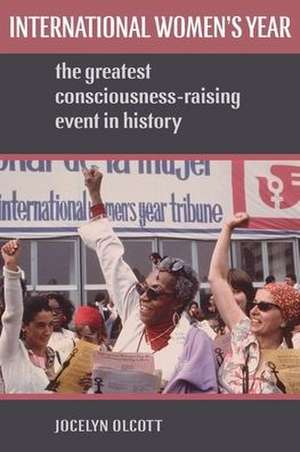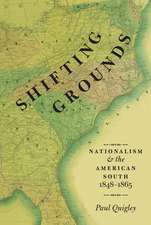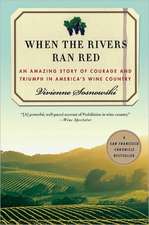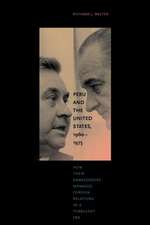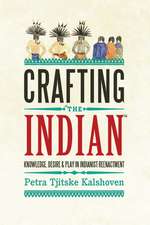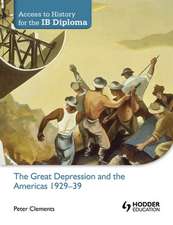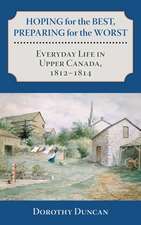International Women's Year: The Greatest Consciousness-Raising Event in History
Autor Jocelyn Olcotten Limba Engleză Paperback – 15 apr 2021
| Toate formatele și edițiile | Preț | Express |
|---|---|---|
| Paperback (1) | 178.57 lei 10-17 zile | |
| Oxford University Press – 15 apr 2021 | 178.57 lei 10-17 zile | |
| Hardback (1) | 285.20 lei 31-38 zile | |
| Oxford University Press – 13 iul 2017 | 285.20 lei 31-38 zile |
Preț: 178.57 lei
Preț vechi: 201.35 lei
-11% Nou
Puncte Express: 268
Preț estimativ în valută:
34.17€ • 36.54$ • 28.49£
34.17€ • 36.54$ • 28.49£
Carte disponibilă
Livrare economică 17-24 martie
Preluare comenzi: 021 569.72.76
Specificații
ISBN-13: 9780197574744
ISBN-10: 0197574742
Pagini: 354
Ilustrații: 35 halftones
Dimensiuni: 155 x 231 x 23 mm
Greutate: 0.5 kg
Editura: Oxford University Press
Colecția OUP USA
Locul publicării:New York, United States
ISBN-10: 0197574742
Pagini: 354
Ilustrații: 35 halftones
Dimensiuni: 155 x 231 x 23 mm
Greutate: 0.5 kg
Editura: Oxford University Press
Colecția OUP USA
Locul publicării:New York, United States
Recenzii
A drama in three acts, with an expansive cast of characters, this engaging history complicates the standard one-dimensional telling of that generative moment in global feminism birthed by the United Nations: the 1975 International Women's Year (IWY) Conference in Mexico City.....Olcott has not only written a definitive study, but her concluding 'Notes on Sources, Theories, and Methods' invites us to think about how we narrate the history of events, the role of contingency, and the reliability of multiple witnesses. This tale of encounters-between North and South, East and West, the grassroots and the bureaucratic-sets a high standard for the practice of international history, no less than the history of feminism.
Jocelyn Olcott has made a terrific contribution to womenâs history and the history of transnational feminismâ. International Womenâs Year is based on a mountain of research that, as far as I can tell, no one else has even attempted in small part. Olcott attacks her subject from as many angles as imaginable
Olcott's detailed study of 1970s feminism... is a global reading set within the wider geo-political and regional divisions as they were shaped and, in turn, impacted the UN commitment to transnational human rights and humanitarian change.
The book's concise and accessible prose makes it a must-read for anyone interested in feminist or gender studies, while the various conceptual bridges it constructs across several fields should make it of particular interest to scholars working on the Non-Aligned Movement, NGO organizations, and the Cold War.
This essential book, meticulously researched and elegantly written, captures a key historical moment in the development of transnational feminism. Olcott recounts the politics that led to the creation of the 1975 'International Women's Year' in a way that reclaims the significance of the now-vanished 'Second World' of the Cold War era....Undoing the dominant narrative of this UN event as a 'failure,' Olcott shows the continuation of such conferences up to Beijing to be a crucial success constructed in and through this first event. By following the money and exploring contestation as well as celebration, the study illuminates the complexity of NGO-ization for feminist movements. Necessary for every serious research library, but great reading for any student of transnational history, feminism, or non-governmental organization. Essential.
No issues more clearly defined the 1970s than the changing status of women and the global struggle for economic justice and national liberation. These two collided at the 1975 International Women's Year conference in Mexico City, producing a spectacular display of both solidarity and conflict. Jocelyn Olcott provides the definitive history of this definitive transnational event.
Through Jocelyn Olcott's prodigious research and vivid narrative, a two-week conference in Mexico City in 1975 becomes a lens for viewing the history of transnational organizing among women in the late twentieth century. Historians and activists alike have much to learn from the tumultuous events that paved the way for so much that followed.
Jocelyn Olcott's terrific account of the International Women's Year conference in Mexico City makes readers feel like they are right in the thick of a key moment in feminist history. Deeply researched and told in compelling detail, Olcott's narrative shows how the interactions and dialogue forged in Mexico City laid the basis for the next several decades of global feminist activism.
A well-paced narrative...[that] adds substantially to the historiography of women on a global stage...Olcott...suggests that unity was never the objective [of the conference]-that the many moments of discord during the proceedings were actually productive. They left indelible impressions on the participants and revealed shared experiences of gender discrimination that transcended nationality and culture...Olcott explains that International Women's Year also left institutional structures in place...[and] galvanized countless governments to form national commissions on women, which, in turn, fostered a burgeoning over four decades of tens of thousands of grassroots NGOs that work across sectors all over the world.
A major contribution of the book is Olcott's documentation in evocative prose of the arduous work of feminist activist methodology: listening to grassroots women with varied political perspectives; building agendas through debate and compromise to ensure policy impact during official conferences; and networking and developing sustained friendships to continue the work beyond the UN. She also valuable elucidates the recent but little-known history of how women's thinking affected global policy frameworks...This rich account of the IWY's global feminist generativity may inspire equally creative future scholarship exploring the relationship between feminist theory and practice, as well as the politics of feminist memory. More importantly...the book offers protection against the cyclical erasure of women's activist history.
Jocelyn Olcott has made a terrific contribution to womenâs history and the history of transnational feminismâ. International Womenâs Year is based on a mountain of research that, as far as I can tell, no one else has even attempted in small part. Olcott attacks her subject from as many angles as imaginable
Olcott's detailed study of 1970s feminism... is a global reading set within the wider geo-political and regional divisions as they were shaped and, in turn, impacted the UN commitment to transnational human rights and humanitarian change.
The book's concise and accessible prose makes it a must-read for anyone interested in feminist or gender studies, while the various conceptual bridges it constructs across several fields should make it of particular interest to scholars working on the Non-Aligned Movement, NGO organizations, and the Cold War.
This essential book, meticulously researched and elegantly written, captures a key historical moment in the development of transnational feminism. Olcott recounts the politics that led to the creation of the 1975 'International Women's Year' in a way that reclaims the significance of the now-vanished 'Second World' of the Cold War era....Undoing the dominant narrative of this UN event as a 'failure,' Olcott shows the continuation of such conferences up to Beijing to be a crucial success constructed in and through this first event. By following the money and exploring contestation as well as celebration, the study illuminates the complexity of NGO-ization for feminist movements. Necessary for every serious research library, but great reading for any student of transnational history, feminism, or non-governmental organization. Essential.
No issues more clearly defined the 1970s than the changing status of women and the global struggle for economic justice and national liberation. These two collided at the 1975 International Women's Year conference in Mexico City, producing a spectacular display of both solidarity and conflict. Jocelyn Olcott provides the definitive history of this definitive transnational event.
Through Jocelyn Olcott's prodigious research and vivid narrative, a two-week conference in Mexico City in 1975 becomes a lens for viewing the history of transnational organizing among women in the late twentieth century. Historians and activists alike have much to learn from the tumultuous events that paved the way for so much that followed.
Jocelyn Olcott's terrific account of the International Women's Year conference in Mexico City makes readers feel like they are right in the thick of a key moment in feminist history. Deeply researched and told in compelling detail, Olcott's narrative shows how the interactions and dialogue forged in Mexico City laid the basis for the next several decades of global feminist activism.
A well-paced narrative...[that] adds substantially to the historiography of women on a global stage...Olcott...suggests that unity was never the objective [of the conference]-that the many moments of discord during the proceedings were actually productive. They left indelible impressions on the participants and revealed shared experiences of gender discrimination that transcended nationality and culture...Olcott explains that International Women's Year also left institutional structures in place...[and] galvanized countless governments to form national commissions on women, which, in turn, fostered a burgeoning over four decades of tens of thousands of grassroots NGOs that work across sectors all over the world.
A major contribution of the book is Olcott's documentation in evocative prose of the arduous work of feminist activist methodology: listening to grassroots women with varied political perspectives; building agendas through debate and compromise to ensure policy impact during official conferences; and networking and developing sustained friendships to continue the work beyond the UN. She also valuable elucidates the recent but little-known history of how women's thinking affected global policy frameworks...This rich account of the IWY's global feminist generativity may inspire equally creative future scholarship exploring the relationship between feminist theory and practice, as well as the politics of feminist memory. More importantly...the book offers protection against the cyclical erasure of women's activist history.
Notă biografică
Jocelyn Olcott is Professor of History and Gender, Sexuality, and Feminist Studies at Duke University. She is the author of Revolutionary Women in Postrevolutionary Mexico and the co-editor of Sex in Revolution: Gender, Politics, and Power in Modern Mexico.
